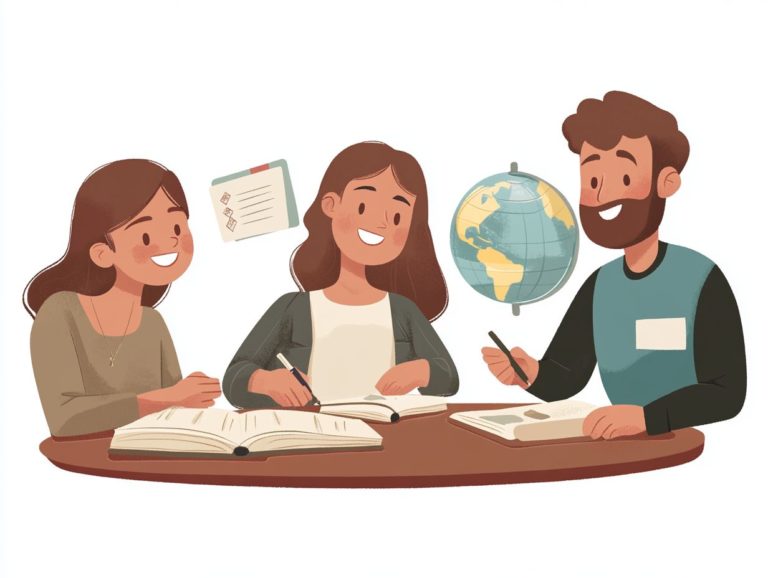How to Overcome Language Learning Plateaus
Language learning can be an exhilarating journey, yet it often presents its fair share of challenges. One of the most exasperating hurdles you might encounter is the plateau those frustrating periods when progress appears to stall, leaving you feeling utterly stuck.
This article delves into the concept of language learning plateaus, exploring their causes and helping you identify when you might be facing one. You’ll discover effective strategies to surmount these lulls, learn when it may be beneficial to seek external assistance, and pick up tips to keep your motivation soaring.
Whether you re just starting out or have advanced your skills, grasping and navigating these plateaus can reignite your passion for language learning.
Contents
- Key Takeaways:
- Understanding Language Learning Plateaus
- Identifying Your Plateau
- Strategies to Overcome Language Learning Plateaus
- Seeking Outside Help
- Maintaining Motivation and Consistency
- Frequently Asked Questions
- What can cause a slowdown in language learning?
- How can I stay motivated when faced with a language learning plateau?
- What are some effective study methods to overcome plateaus?
- How can I maintain consistency in my language learning journey?
- Is it beneficial to take a break from studying when facing a plateau?
- How can I make language learning more enjoyable and overcome plateaus?
Key Takeaways:

Recognize the signs of a plateau, such as feeling stuck or not making progress.
Try new techniques, such as immersion or spaced repetition, to break through your plateau.
Seek external help, like a tutor or language exchange, for support and skill improvement.
Understanding Language Learning Plateaus
Language learning plateaus are a familiar experience for advanced learners, where progress seems to stall even with persistent effort. This can be particularly disheartening for both you and your instructors as you pursue specific goals.
Recognizing the nature of these plateaus is essential for you to identify effective strategies that will help maintain your motivation and ensure continuous development in vocabulary, grammar, and communication skills.
Definition and Causes
A language learning plateau happens when you’re stuck in a rut with your language acquisition. It is often marked by common mistakes and a frustrating lack of progress. This experience can be particularly exasperating, as it may feel like you’re pouring in a lot of effort without reaping any tangible rewards.
This stagnation often comes from self-evaluation. Being overly critical of your abilities can sap your motivation and confidence. You might find yourself making common mistakes, such as not adequately assessing your progress or failing to adjust your practice methods.
Factors like your learning environment, a lack of helpful feedback, and limited interaction opportunities can amplify your frustrations.
Feedback is essential for navigating these plateaus; it offers the guidance you need to identify errors and encourages a more focused approach to overcoming the hurdles in your language journey.
Identifying Your Plateau
Identifying a language learning plateau requires you to recognize certain signs and symptoms that indicate stagnation in your progress. These often reflect a decrease in engagement or motivation, signaling that it may be time to reassess your approach and reinvigorate your learning journey.
Signs and Symptoms

Common signs and symptoms of a language learning plateau might include persistent mistakes, a noticeable lack of improvement in fluency, and a dwindling motivation to practice. These indicators can manifest in various ways.
For instance, you might find yourself repeatedly making the same grammatical errors despite previous corrections, which can lead to growing frustration and discouragement. This stagnation often becomes particularly apparent in conversations, where your fluency may seem to stall, making it challenging to express your thoughts as effortlessly as before.
Your language journey, once thrilling, may now feel like a chore, diminishing your enthusiasm for practice sessions.
To tackle these challenges, timely feedback is essential; constructive critiques can help you pinpoint specific areas that need improvement. Introducing fresh materials, setting smaller, achievable goals, and engaging in diverse activities can reignite your motivation and restore a renewed sense of purpose in your language-learning journey.
Strategies to Overcome Language Learning Plateaus
To overcome language learning plateaus, you must act quickly. Implement effective strategies and techniques that ignite your creativity by exploring how to tackle common language learning challenges. Engaging with authentic materials will enrich your learning experience and help you break through those barriers.
Effective Techniques and Methods
Effective techniques for overcoming language learning plateaus include immersing yourself in experiences, learning with friends, and increasing your exposure to the target language in diverse contexts. For more tips, check out this guide on how to stay consistent in language learning. These strategies not only enhance your language acquisition but also significantly boost your motivation and engagement.
Immersive experiences, such as traveling to a country where the language is spoken, allow you to practice in real-life situations. For instance, when you order food at a local restaurant or engage in casual conversations with native speakers, you reinforce your vocabulary and grammar structures in a practical way.
Learning with friends fosters a collaborative environment where you and your fellow learners can share knowledge, correct mistakes, and offer support. This leads to a deeper understanding and better retention of skills.
By combining these approaches, you create a holistic learning atmosphere that encourages active participation and accelerates your progress.
Seeking Outside Help
For those encountering ongoing plateaus in their learning journey, seeking external assistance can offer fresh perspectives and innovative strategies. This approach is a game-changer for advanced learners who want to reignite their motivation and elevate their progress.
When to Consider a Tutor or Language Exchange

Consider a tutor or language exchange when you notice consistent mistakes in your language use or feel like you’re hitting a wall in your progress. These signs often suggest that a deeper understanding of the language is essential.
Assessments might pinpoint specific grammatical areas that require improvement, or evaluations could reveal a lack of vocabulary diversity. Tackle these challenges with external support to gain tailored strategies to elevate your skills.
A tutor can offer personalized feedback that hones in on the exact issues you face. Engaging in language exchanges provides practical opportunities to apply new skills in real conversations, allowing you to practice speaking and listening in a nurturing environment.
Maintaining Motivation and Consistency
Maintaining motivation and consistency in your language learning journey is crucial for overcoming inevitable plateaus. It demands effective routines and engaging techniques that will keep you on track and inspired every step of the way.
Tips for Staying on Track
Practical tips for staying on track include setting specific objectives, maintaining daily routines, and discovering engaging methods to reinforce your skills. To excel in acquiring a new language, devise a structured plan that outlines your goals while integrating enjoyable activities into your daily life.
This could mean blending traditional study techniques, like vocabulary drills, with interactive apps or language games that transform practice from a chore into a delight. Incorporating a variety of materials such as podcasts, films, or books can greatly enhance your comprehension and retention.
By embracing diversity and ensuring your study sessions remain lively and enjoyable, you can cultivate sustained motivation and commitment to your language-learning adventure.
Frequently Asked Questions
What can cause a slowdown in language learning?

Language learning plateaus can be caused by a variety of factors, such as lack of motivation, ineffective study methods, or simply reaching a point of saturation where progress becomes slower.
How can I stay motivated when faced with a language learning plateau?
Set achievable goals and track your progress. Find a language learning partner for support and encouragement.
What are some effective study methods to overcome plateaus?
Effective study methods include practicing with native speakers, using flashcards or other language learning apps, and focusing on specific areas of weakness.
How can I maintain consistency in my language learning journey?
Consistency is key to overcoming language learning plateaus. Establish a regular study schedule and stick to it.
Setting achievable goals keeps you motivated.
Is it beneficial to take a break from studying when facing a plateau?
A short break can boost your energy and creativity! However, don’t let it stretch into a long pause in your language learning.
How can I make language learning more enjoyable and overcome plateaus?
Incorporate language learning into your daily life. Watch TV shows or movies in your target language, listen to music, or read books.
Find a learning method that suits you. This will make the process enjoyable and help you break through plateaus!






